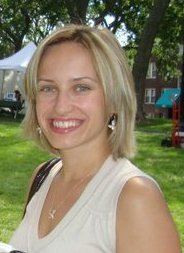Where are they now?
|
More AlumniKathryn BerlinAndres E. Carrillo Aleda Chen Krista Cline Katie Hill Gallant Megan Gilligan Kimberly Hurley Heidi IglayReger Jessica Kelley Seoyoun Kim Min-Ah Lee Mary Marshall Megan MacPherson Lauren Parker Lindsay Pitzer Markus Schafer Jori Sechrist Amber Seidel Tetyana P. Shippee John Spruill III April J. Stull Anusha Sundarrajan Roland J. Thorpe Kyle Timmerman Nicholas Turiano Lori Ward Oliver Wendt Lindsay Wilkinson Tim Wright |
Tetyana Pylypiv Shippee received a Dual-Title PhD in Sociology and Gerontology in 2008 and remained a research associate with the Center on Aging and the Life Course from 2008-2010. Currently, she is an Assistant Professor at the University Of Minnesota School Of Public Health, Division of Health Policy and Management. As part of her interdisciplinary training at Purdue, Dr. Shippee spent two years living in a continuing care retirement community, examining relocations and community building among older adults. Her current research focuses on discrimination and health care use, health inequality, and decision-making in long-term care. What do you remember best about your time in the Gerontology Program?I have so many fond memories of my time at Purdue and many of them relate to my interdisciplinary training. I enjoyed having two cohorts of peers (those in sociology and gerontology), taking classes in different departments, and being mentored by faculty with different areas of expertise. Also, I appreciated having professional training seminars for those of us in the gerontology program. Who were your mentors and what attributes did they have that helped you?My professional achievements would not have been possible without the mentorship and support of my major professor, Ken Ferraro, Distinguished professor of Sociology and Director of the Center on Aging and the Life Course. I worked for Ken as a research assistant for 5 years and he chaired both my master’s and dissertation committees. I still collaborate with him as an assistant professor. He has encouraged me to develop as an independent thinker and researcher and has introduced me into the world of publishing. I appreciate him attending my wedding and inviting my husband and me for meals at his house. As an assistant professor, I hope to follow his example in mentorship. How did you get interested in gerontology?I became interested in gerontology as an undergraduate student because of a course on the sociology of aging and a close friendship with an older couple. After that, I’ve had many opportunities to interact with older adults, whether as friends, research subjects, or mentors. What research experiences did you have at Purdue that helped form your current agenda?Being a part of a research group was key in developing my own research agenda. Also, professional development seminars in the gerontology program are very helpful in orienting one to the world of publishing and grant activity. Finally, I enjoyed seminars on my substantive topics of interest (e.g., early predictors of adult health) which helped me to develop a base of knowledge in these areas. |
